(完整版)延续性动词与短暂性动词讲解与练习
现在完成时延续性与暂短性动词用法

现在完成时(短暂性动词与延续性动词)的用法基本结构:主语+have/has+过去分词(done)①肯定句:主语+have/has+过去分词+其他②否定句:主语+have/has+not+过去分词+其他③一般疑问句:Have/Has+主语+过去分词+其他④特殊疑问句:特殊疑问词+一般疑问句(have/has+主语+过去分词+其他)(1)现在完成时用来表示现在之前已发生过或完成的动作或状态,但其结果却和现在有联系,也就是说,动作或状态发生在过去但它的影响现在还存在.I have spent all of my money.(含义是:现在我没有钱花了.)Jane has laid the table.(含义是:现在桌子已经摆好了.)Michael has been ill.(含义是:现在仍然很虚弱)He has returned from abroad. (含义是:现在已在此地)(2)现在完成时可以用来表示发生在过去某一时刻的,持续到现在的动作(用行为动词表示)或状态(be动词表示)常与for(+时间段),since(+时间点或过去时的句子)连用. Mary has been ill for three days.I have lived here since 1998.注(超重要):瞬间动词(buy,die,join,lose……)不能直接与for since 连用。
要改变动词come-be go out-be out finish-be over open-be opendie-be dead1.have代替buyMy brother has had(不能用has bought) this bike for almost four years.2、用keep或have代替borrowI have kept(不能用have borrowed) the book for quite a few days.3、用be替代becomeHow long has your sister been a teacher?4、用have a cold代替catch a coldTom has had a cold since the day before yesterday.5、用wear代替put onb)用“be+形容词”代终止性动词1、be+married代marry2、be+ill代fall (get) ill3、be+dead代die4、be+asleep代fall (get) asleep5、be+awake代wake/wake up6、be+gone代lose,die,sell,leave7、be+open代open 8、be closed代close/shut9、be+missing(gone,lost)代losec)用“be+副词”代终止性动词1“be+on”代start,begin2“be+up”代get up3“be+back(to)”代return to,come back to,go back to4“be here (there)”代come(arrive,reach,get) here或go (arrive,reach,get) there等等d)用“be+介词短语”代终止性动词1.“be in/at +地点”代替go to /come to2.用be in the army 代替join the army3.“be in/at +地点”代替move to常用瞬间动词变延续性动词表:1. have arrived at/in sw. got to/reached sw. come/gone/moved to sw.→have been in sw./at…相应的介词2. have come/gone back/returned → have been back3. have come/gone out →have b een out4. have become → have been5. have closed / opened→ have been close/open6. have got up → have been up;7. have died → have been dead;8. have left sw. → have been away from sw.9. have fallen asleep/got to sleep → have been asleep;10. have finished/ended/completed → have been over;11. Have married → have been married;12. have started/begun to do sth. → have done sth. ;13. have begun → have been on14. have borrowed/bought →have kept/had15. have lost → haven’t had16. have put on →have worn17. have caught /get a cold → have had a cold;18. have got to know → have known19. have/has gone to → have been in20. have joined/have taken part in the league/the Party/the army→have been a member of/ have been in/have been the Party’s member/the league member/the soldier…注意:1.现在完成时不能单独与准确时间连用,(如表示过去的时间状语)如yesterday(morning、afternoon),last(morning、afternoon)等,除非与for,since连用.2.现在完成时往往同表示不确定的过去时间状语连用,如already(肯定), yet(否定,疑问), just, before, recently,still, lately等:He has already obtained(得到\获得) a scholarship(奖学金).I haven't seen much of him recently (lately).We have seen that film before.Have they found the missing child yet ?3. 现在完成时常常与表示频度的时间状语连用,如often, sometimes, ever, never, twice等:Have you ever been to BeijingI have never heard Bunny say anything against her.I have used this pen only three times. It is still good.4. 现在完成时还往往可以同包括现在时间在内的时间状语连用,如now, these days/weeks/months/years, this morning/week/month/year, just, today, so far 等:Peter has written six papers so far.There has been too much rain in San Francisco this year.5.现在完成时的"完成用法"现在完成时的"完成用法"指的是动作发生在过去某一时刻并已结束,但该动作对现在产生了影响,与现在情况具有因果关系。
常用短暂性动词与延续性动词及其例句
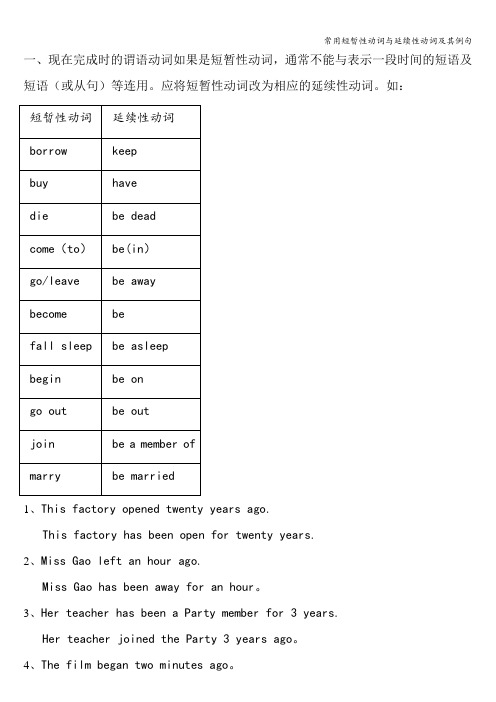
一、现在完成时的谓语动词如果是短暂性动词,通常不能与表示一段时间的短语及短语(或从句)等连用。
应将短暂性动词改为相应的延续性动词。
如:1、This factory opened twenty years ago.This factory has been open for twenty years.2、Miss Gao left an hour ago.Miss Gao has been away for an hour。
3、Her teacher has been a Party member for 3 years.Her teacher joined the Party 3 years ago。
4、The film began two minutes ago。
The film has been on since two minutes ago。
5、He bought the bike two years ago.He has had the bike for two years。
6、The old man died ten years ago.The old man has been dead for ten years.7、He came back 3 days ago.He has been back for 3 days。
8、I left my hometown 10 years ago.I have been away from my hometown for 10 years.9、They got married 13 year ago.They have been married for 13 years。
10、I borrowed the book a week ago。
I have kept the book for a week.How long have you kept the book?注:在否定句中,短暂性动词可以和表示一段时间的状语连用。
延续性动词与短暂性动词讲解与练习
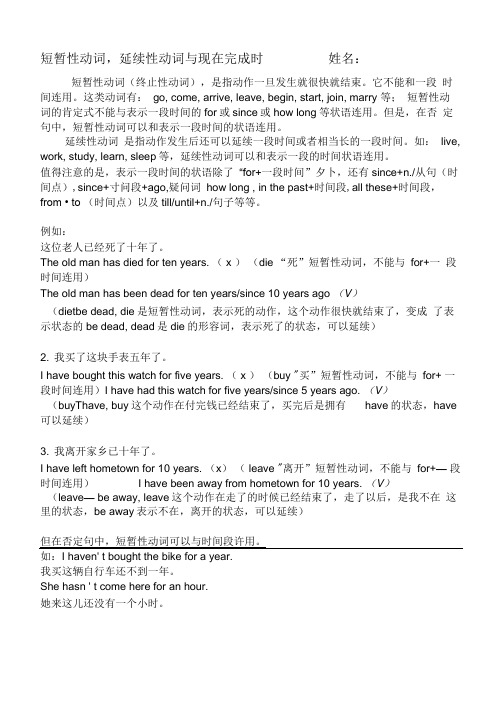
短暂性动词,延续性动词与现在完成时姓名:短暂性动词(终止性动词),是指动作一旦发生就很快就结束。
它不能和一段时间连用。
这类动词有:go, come, arrive, leave, begin, start, join, marry 等;短暂性动词的肯定式不能与表示一段时间的for或since或how long等状语连用。
但是,在否定句中,短暂性动词可以和表示一段时间的状语连用。
延续性动词是指动作发生后还可以延续一段时间或者相当长的一段时间。
如:live, work, study, learn, sleep等,延续性动词可以和表示一段的时间状语连用。
值得注意的是,表示一段时间的状语除了“for+一段时间”夕卜,还有since+n./从句(时间点),since+寸问段+ago,疑问词how long , in the past+时间段,all these+时间段,from • to (时间点)以及till/until+n./句子等等。
例如:这位老人已经死了十年了。
The old man has died for ten years. ( x )(die “死”短暂性动词,不能与for+一段时间连用)The old man has been dead for ten years/since 10 years ago (V)(dietbe dead, die是短暂性动词,表示死的动作,这个动作很快就结束了,变成了表示状态的be dead, dead是die的形容词,表示死了的状态,可以延续)2. 我买了这块手表五年了。
I have bought this watch for five years. ( x )(buy "买”短暂性动词,不能与for+ 一段时间连用)I have had this watch for five years/since 5 years ago. (V)(buyThave, buy这个动作在付完钱已经结束了,买完后是拥有have的状态,have 可以延续)3. 我离开家乡已十年了。
(完整版)瞬间性动词与延续性动词(新)
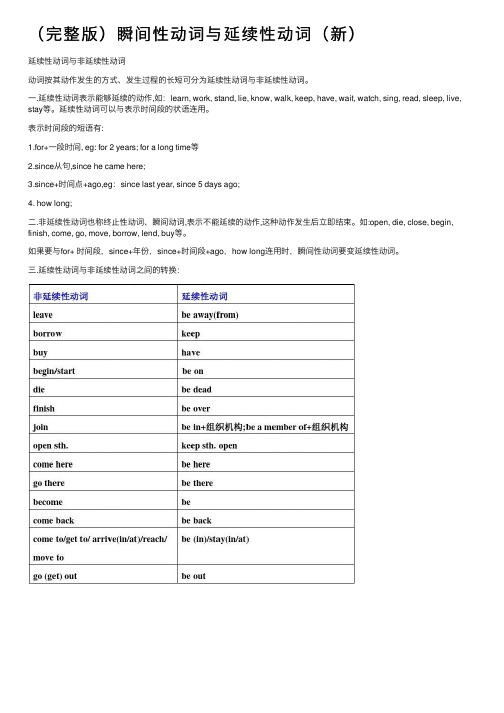
(完整版)瞬间性动词与延续性动词(新)延续性动词与⾮延续性动词动词按其动作发⽣的⽅式、发⽣过程的长短可分为延续性动词与⾮延续性动词。
⼀.延续性动词表⽰能够延续的动作,如:learn, work, stand, lie, know, walk, keep, have, wait, watch, sing, read, sleep, live, stay等。
延续性动词可以与表⽰时间段的状语连⽤。
表⽰时间段的短语有:1.for+⼀段时间, eg: for 2 years; for a long time等2.since从句,since he came here;3.since+时间点+ago,eg:since last year, since 5 days ago;4. how long;⼆.⾮延续性动词也称终⽌性动词、瞬间动词,表⽰不能延续的动作,这种动作发⽣后⽴即结束。
如:open, die, close, begin, finish, come, go, move, borrow, lend, buy等。
如果要与for+ 时间段,since+年份,since+时间段+ago,how long连⽤时,瞬间性动词要变延续性动词。
三.延续性动词与⾮延续性动词之间的转换:例:(1)他死了三年了。
误:He has died for three years.正:He has been dead for three years.正:He died three years ago.正:It is three years since he died.正:Three years has passed since he died.(2) 他来这⼉五天了。
误:He has come here for five days.正:He has been here for five days.正:He came here five days ago.正:It is five days since he came here.正:Five days has passed since he came here. (1)、(2)句中的die、come为终⽌性动词,不能与表⽰"段时间"的状语连⽤。
短暂性动词及连续性动词辨析及用法

短暂性动词及连续性动词辨析及用法短暂性动词也称非延续性动词、瞬间动词,表示不能延续的动作发生后立即结束。
open,close,finish,begin,come,go,arrive,reach,getto,leave,move,borrow, buy,die,see,hear,fall,start,like,love,win,shot,enter,finish,lend,连续性动词live,run,stay,clean,play,hold,watch,teach,read,study,teach,eat,drink, write,dance, sing,smoke具体用法:1、终止性动词:表示不能延续的动作,即动作发生后立即结束。
如:begin,arrive,borrow,buy,break,close,come,fall,dic,finish,go,leave,len d,mary,reach,receive,open,sell,start,stop等。
终止性动词的肯定式是不能持续的,所以不能和表示一段时间的状语连用,而终止性的否定式就可以和表一段时间的状语连用,因为否定本身就是可以延续的。
如:have a cold是持续性动词,表示“状态”,可与表延续性的时间状语连用,不定冠词不能省略。
I′ve had a cold since my arrival(到达 n.).I didn′t go to school because I had had a bad cold for days.catch a cold是短暂性动作,表“动态”:它不能和延续性时间状语连用,不定冠词“a”可有可无,catch可用take,get代替,1, Put on your coat,or you′ll catch/take/get a cold. 2,Take care not to get cold. ,但是,若cold前有形容词修饰时,则不定冠词不能省。
现在完成时延续性与暂短性动词用法

现在完成时(短暂性动词与延续性动词)的用法基本结构:主语+have/has+过去分词(done)①肯定句:主语+have/has+过去分词+其他②否定句:主语+have/has+not+过去分词+其他③一般疑问句:Have/Has+主语+过去分词+其他④特殊疑问句:特殊疑问词+一般疑问句(have/has+主语+过去分词+其他)(1))现在完成时用来表示现在之前已发生过或完成的动作或状态,但其结果却和现在有联系, 也就是说,动作或状态发生在过去但它的影响现在还存在.I have spent all of my money.(含义是:现在我没有钱花了.)Jane has laid the table.含( 义是:现在桌子已经摆好了.)Michael has been ill.(含义是:现在仍然很虚弱)He has returned from abroad. 含(义是:现在已在此地)(2)现在完成时可以用来表示发生在过去某一时刻的,持续到现在的动作(用行为动词表示)或状态(be 动词表示)常与for(+时间段),since(+时间点或过去时的句子)连用.Mary has been ill for three days.I have lived here since 1998.注(超重要):瞬间动词(buy,die,join,lose )不能直接与for since 连用。
要改变动词come-be go out-be out finish-be over open-be opendie-be dead1.have 代替buyMy brother has had(不能用has bought) this bike for almost four years.2、用keep或have 代替borrowI have kept(不能用have borrowed) the book for quite a few days.3、用be 替代becomeHow long has your sister been a teacher?4、用have a cold代替catch a coldTom has had a cold since the day before yesterday.5、用wear 代替put onb)用“b+e 形容词”代终止性动词1、be+married 代marry2、be+ill 代fall (get) ill3、be+dead代die4、be+asleep代fall (get) asleep5、be+awake代wake/wake up6、be+gone代lose,die,sell,leave7、be+open 代open8、be closed代close/shut9、be+missing(gone,lost)代losec)用“b+e 副词”代终止性动词1“b+e 2“b+e on”代start,begin up”代get up3“b+e back(to) 代”return to,come back to,go back to4“be here (there代) co”m e(arrive,reach,get) here或go (arrive,reach,get) there等等d)用“b+e 介词短语”代终止性动词1. “be in/at地+点”代替go to /come to2.用be in the army 代替join the army3. “be in/at地+点”代替move to常用瞬间动词变延续性动词表:1. have arrived at/in sw. got to/reached sw. come/gone/moved to sw.→have been in sw./at 相应的介词2. have come/gone back/returned → have been back3. have come/gone out →h e a e v n e o b u t4. have become → have been5. have closed / opened → have been close/open6. have got up →have be;e n up7. have died →have been;dead8. have left sw. → have been away from sw.9. have fallen asleep/got to sleep →have;been asleep10. have finished/ended/completed →have b;een over11. Have married →have been ma;rried12. have started/begun to do sth. →have;done sth.13. have begun → have been on14. have borrowed/bought →have kept/had15. have lost → haven ’t had16. have put on →have worn17. have caught /get a cold →have h;ad a cold18. have got to know → have known19. have/has gone to → have been in20. have joined/have taken part in the league/the Party/the army→have been a member of/ have been in/havbeeen the Party ’s member/the league member/the soldier注意: 1.现在完成时不能单独与准确时间连用,(如表示过去的时间状语)如yesterday(morning、afternoon),last(morning、afternoon)等,除非与for,since 连用.2.现在完成时往往同表示不确定的过去时间状语连用,如already(肯定), yet(否定,疑问), just, before, recently,still, lately 等:He has already obtained得(到获得) a scholarship(奖学金).I haven't seen much of him recently (lately).We have seen that film before.Have they found the missing child yet ?3. 现在完成时常常与表示频度的时间状语连用,如often, sometimes, ever, never, twice等:Have you ever been to BeijingI have never heard Bunny say anything against her.I have used this pen only three times. It is still good.4. 现在完成时还往往可以同包括现在时间在内的时间状语连用,如now, these days/weeks/months/years, this morning/week/month/year, just, today, so f a等r : Peter has written six papers so far.There has been too much rain in San Francisco this year.5. 现在完成时的" 完成用法"现在完成时的" 完成用法" 指的是动作发生在过去某一时刻并已结束,但该动作对现在产生了影响,与现在情况具有因果关系。
短暂性动词与延续性动词语法讲解教学总结

短暂性动词与延续性动词语法讲解初中短暂性动词与延续性动词语法讲解根据有无含义,动词可分为实义动词和助动词;根据动词所表示的是动作还是状态,可以分为行为动词和状态动词;根据动词所表示的动作能否延缓,分为延续性动词和终止性动词。
(一)持续性动词: 表示动作通常是持续性的,如:live,run,stay,clean,play,hold,watch,teach,read,study,teach,eat,drink,write, dance, sing,smoke①常与段时间连用。
例如:Mr Zhang has lived here for two years.张先生在这儿住了两年了。
He has taught there since 1987.自1987年来他一直在那儿教书。
②不与点时间连用(do, have, eat等除外)。
例如:Mary has worked at eight. (×)She walked at five yesterday. (×)(二)瞬间性动词: 表示动作开始即停止,如:open,stop,like,love,die,win,close,shot,begin,startenter,finish,arrive,borrow,buy,break,close,come,fall,go,leave,lend,mary,r each,receive , sell,等。
1,从“开始发生”到“结束/终止”:几乎同时或在极短的时间里(如‘几秒钟/几分钟内’)就完成了“开始—结束”的过程,如“Close the door”, “Open the door”2,有些瞬间动词的“开始—结束的过程”可能稍微长一些,但也不会很长的,如,“buy sth(买下)”:付了款、拿了发票即完成了。
所以,“我买了这块手表5年了”,在汉语中说的通,但英语的表达就不能说:I have bought the watch for five years.buy sth ---- have sth (拥有)---have/has + had sth for…A: I have had the watch for 5 years.B: It is (has been) five years since I bought the watch.C: I bought it 5 years ago.同理,“borrow sth”“借书”在办理了相关的‘登记’手续后就结束了,不可能“借”几个星期或好几年的!汉语“这本书我已经借用了2星期了。
延续性动词和短暂性动词

例子
学习
需要一段时间来掌握知识和技能 。
工作
通常指一段时间内从事某种职业或 任务。
等待
表示在一段时间内保持某种状态或 期望某事发生。
与短暂性动词的区别
短暂性动词表示的动作或状态持续时 间较短,如“看”、“听”、“摸” 等。
例如,“看”是一个短暂性动词,表 示瞬间完成的动作,而“学习”是一 个延续性动词,表示需要一段时间来 完成的动作。
延续性动词和短暂 性动词
contents
目录
• 延续性动词 • 短暂性动词 • 延续性动词和短暂性动词的使用场景 • 延续性动词和短暂性动词的转换 • 练习与巩固
01
CATALOGUE
延续性动词
定义
01
延续性动词表示的动作或状态持 续时间较长,如“学习”、“工 作”、“等待”等。
02
延续性动词强调动作或状态在一 段时间内的持续性,而不是瞬间 的完成。
延续性动词转换为短暂性动词
睡觉:醒来
抽烟:抽一口 写作:写完
学习:学会 游泳:游过
延续性动词转换为短暂性动词
开车:开一下
唱歌:唱一段
01
02
03
看书:看一眼
喝咖啡:喝一口
04
05
穿衣服:穿一下
短暂性动词转换为延续性动词
离开:逗留 来/去:停留在
结婚:与某人相处
短暂性动词转换为延续性动词
死亡:生活过 到达:在某地待一段时间
示例
我喜欢(看/看过)电影。在这个句子 中,正确的动词形式是“看”,因为 它是一个表示动作的延续性动词。
造句练习
造句练习
根据给定的主题或提示,使用正确的动词形式造句。
示例
短暂性动词与延续性动词详解-转换表及练习(汇编)
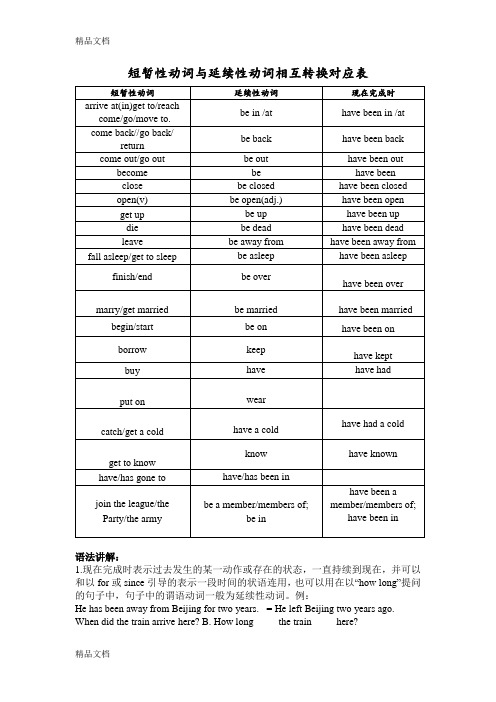
短暂性动词与延续性动词相互转换对应表短暂性动词延续性动词现在完成时arrive at(in)get to/reachcome/go/move to.be in /at have been in /at come back//go back/returnbe back have been back come out/go out be out have been out become be have beenclose be closed have been closedopen(v) be open(adj.) have been openget up be up have been updie be dead have been deadleave be away from have been away from fall asleep/get to sleep be asleep have been asleepfinish/end be overhave been over marry/get married be married have been married begin/start be on have been onborrow keephave kept buy have have hadput on wearcatch/get a cold have a coldhave had a cold get to knowknow have known have/has gone to have/has been injoin the league/the Party/the army be a member/members of;be inhave been amember/members of;have been in语法讲解:1.现在完成时表示过去发生的某一动作或存在的状态,一直持续到现在,并可以和以 for或since引导的表示一段时间的状语连用,也可以用在以“how long”提问的句子中,句子中的谓语动词一般为延续性动词。
短暂性动词和延续性动词
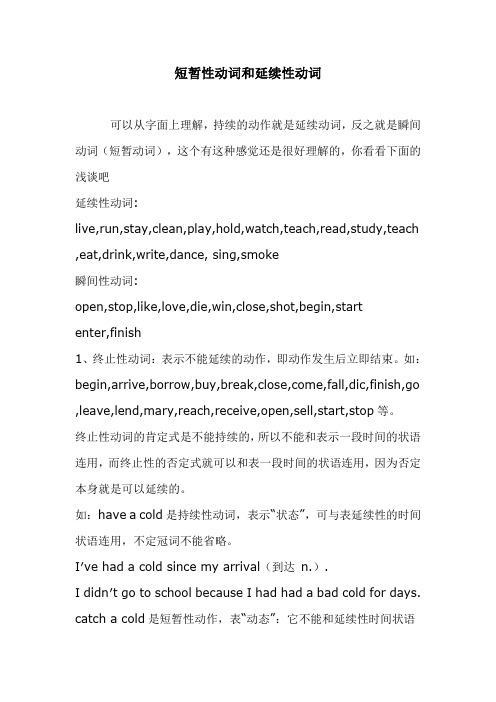
短暂性动词和延续性动词可以从字面上理解,持续的动作就是延续动词,反之就是瞬间动词(短暂动词),这个有这种感觉还是很好理解的,你看看下面的浅谈吧延续性动词:live,run,stay,clean,play,hold,watch,teach,read,study,teach ,eat,drink,write,dance, sing,smoke瞬间性动词:open,stop,like,love,die,win,close,shot,begin,startenter,finish1、终止性动词:表示不能延续的动作,即动作发生后立即结束。
如:begin,arrive,borrow,buy,break,close,come,fall,dic,finish,go ,leave,lend,mary,reach,receive,open,sell,start,stop等。
终止性动词的肯定式是不能持续的,所以不能和表示一段时间的状语连用,而终止性的否定式就可以和表一段时间的状语连用,因为否定本身就是可以延续的。
如:have a cold是持续性动词,表示“状态”,可与表延续性的时间状语连用,不定冠词不能省略。
I′ve had a cold since my arrival(到达n.).I didn′t go to school because I had had a bad cold for days. catch a cold是短暂性动作,表“动态”:它不能和延续性时间状语连用,不定冠词“a”可有可无,catch可用take,get代替。
Put on your coat,or you′ll catch/take/get a cold.Take care not to get cold.但是,若cold前有形容词修饰时,则不定冠词不能省。
如:Brown has taken a slight cold.注意下列句子:I have caught a cold for over a week.(×)I have had a cold for over a week.( )2、延续性动词:表示可以延续一段时间的动作或状态。
短暂性动词与延续性动词语法讲解
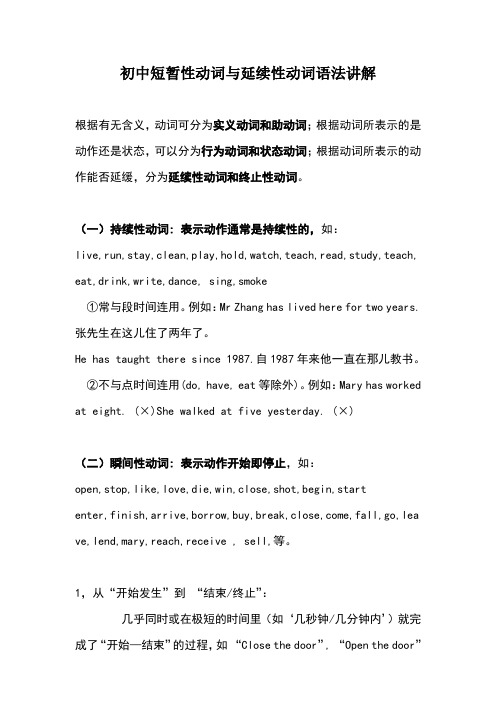
初中短暂性动词与延续性动词语法讲解根据有无含义,动词可分为实义动词和助动词;根据动词所表示的是动作还是状态,可以分为行为动词和状态动词;根据动词所表示的动作能否延缓,分为延续性动词和终止性动词。
(一)持续性动词: 表示动作通常是持续性的,如:live,run,stay,clean,play,hold,watch,teach,read,study,teach, eat,drink,write,dance, sing,smoke①常与段时间连用。
例如:Mr Zhang has lived here for two years.张先生在这儿住了两年了。
He has taught there since 1987.自1987年来他一直在那儿教书。
②不与点时间连用(do, have, eat等除外)。
例如:Mary has worked at eight. (×)She walked at five yesterday. (×)(二)瞬间性动词: 表示动作开始即停止,如:open,stop,like,love,die,win,close,shot,begin,startenter,finish,arrive,borrow,buy,break,close,come,fall,go,lea ve,lend,mary,reach,receive , sell,等。
1,从“开始发生”到“结束/终止”:几乎同时或在极短的时间里(如‘几秒钟/几分钟内’)就完成了“开始—结束”的过程,如“Close the door”, “Open the door”2,有些瞬间动词的“开始—结束的过程”可能稍微长一些,但也不会很长的,如,“buy sth(买下)”:付了款、拿了发票即完成了。
所以,“我买了这块手表5年了”,在汉语中说的通,但英语的表达就不能说:I have bought the watch for five years.buy sth ---- have sth (拥有)---have/has + had sth for…A: I have had the watch for 5 years.B: It is (has been) five years since I bought the watch. C: I bought it 5 years ago.同理,“borrow sth”“借书”在办理了相关的‘登记’手续后就结束了,不可能“借”几个星期或好几年的!汉语“这本书我已经借用了2星期了。
短暂性动词与延续性动词语法讲解
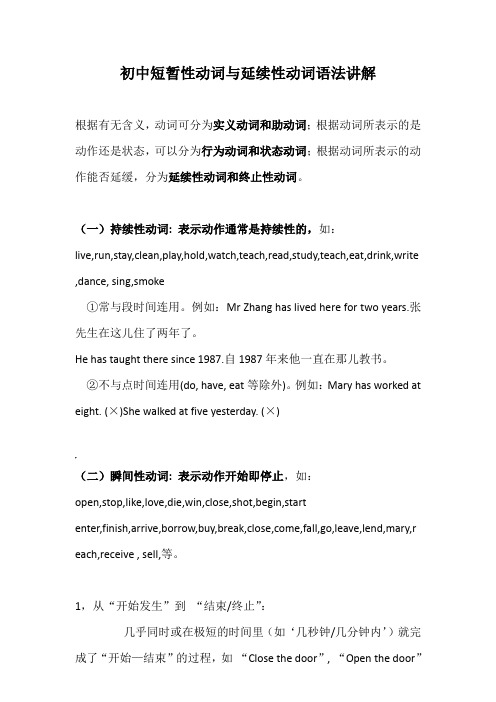
初中短暂性动词与延续性动词语法讲解根据有无含义,动词可分为实义动词和助动词;根据动词所表示的是动作还是状态,可以分为行为动词和状态动词;根据动词所表示的动作能否延缓,分为延续性动词和终止性动词。
(一)持续性动词: 表示动作通常是持续性的,如:live,run,stay,clean,play,hold,watch,teach,read,study,teach,eat,drink,write ,dance, sing,smoke①常与段时间连用。
例如:Mr Zhang has lived here for two years.张先生在这儿住了两年了。
He has taught there since 1987.自1987年来他一直在那儿教书。
②不与点时间连用(do, have, eat等除外)。
例如:Mary has worked at eight. (×)She walked at five yesterday. (×),(二)瞬间性动词: 表示动作开始即停止,如:open,stop,like,love,die,win,close,shot,begin,startenter,finish,arrive,borrow,buy,break,close,come,fall,go,leave,lend,mary,r each,receive , sell,等。
1,从“开始发生”到“结束/终止”:几乎同时或在极短的时间里(如‘几秒钟/几分钟内’)就完成了“开始—结束”的过程,如“Close the door”, “Open the door”2,有些瞬间动词的“开始—结束的过程”可能稍微长一些,但也不会很长的,如,“buy sth(买下)”:付了款、拿了发票即完成了。
所以,“我买了这块手表5年了”,在汉语中说的通,但英语的表达就不能说:I have bought the watch for five years.buy sth ---- have sth (拥有)---have/has + had sth for…A: I have had the watch for 5 years.、B: It is (has been) five years since I bought the watch.C: I bought it 5 years ago.同理,“borrow sth”“借书”在办理了相关的‘登记’手续后就结束了,不可能“借”几个星期或好几年的!汉语“这本书我已经借用了2星期了。
短暂性动词与延续性动词语法讲解
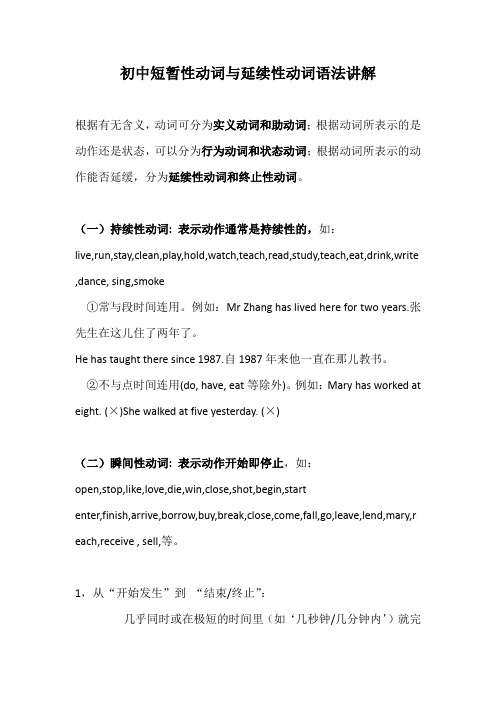
初中短暂性动词与延续性动词语法讲解根据有无含义,动词可分为实义动词和助动词;根据动词所表示的是动作还是状态,可以分为行为动词和状态动词;根据动词所表示的动作能否延缓,分为延续性动词和终止性动词。
(一)持续性动词: 表示动作通常是持续性的,如:live,run,stay,clean,play,hold,watch,teach,read,study,teach,eat,drink,write ,dance, sing,smoke①常与段时间连用。
例如:Mr Zhang has lived here for two years.张先生在这儿住了两年了。
He has taught there since 1987.自1987年来他一直在那儿教书。
②不与点时间连用(do, have, eat等除外)。
例如:Mary has worked at eight. (×)She walked at five yesterday. (×)(二)瞬间性动词: 表示动作开始即停止,如:open,stop,like,love,die,win,close,shot,begin,startenter,finish,arrive,borrow,buy,break,close,come,fall,go,leave,lend,mary,r each,receive , sell,等。
1,从“开始发生”到“结束/终止”:几乎同时或在极短的时间里(如‘几秒钟/几分钟内’)就完成了“开始—结束”的过程,如“Close the door”, “Open the door”2,有些瞬间动词的“开始—结束的过程”可能稍微长一些,但也不会很长的,如,“buy sth(买下)”:付了款、拿了发票即完成了。
所以,“我买了这块手表5年了”,在汉语中说的通,但英语的表达就不能说:I have bought the watch for five years.buy sth ---- have sth (拥有)---have/has + had sth for…A: I have had the watch for 5 years.B: It is (has been) five years since I bought the watch.C: I bought it 5 years ago.同理,“borrow sth”“借书”在办理了相关的‘登记’手续后就结束了,不可能“借”几个星期或好几年的!汉语“这本书我已经借用了2星期了。
短暂性动词与延续性动词详解转换表及练习(终审稿)

短暂性动词与延续性动词详解转换表及练习文稿归稿存档编号:[KKUY-KKIO69-OTM243-OLUI129-G00I-FDQS58-短暂性动词与延续性动词相互转换对应表语法讲解:1.现在完成时表示过去发生的某一动作或存在的状态,一直持续到现在,并可以和以?for或since引导的表示一段时间的状语连用,也可以用在以“how?long”提问的句子中,句子中的谓语动词一般为延续性动词。
例:HehasbeenawayfromBeijingfortwoyears.=HeleftBeijingtwoyearsago. WhendidthetrainarrivehereB.Howlong____thetrain____here2.在现在完成时的肯定句中,非延续性动词作谓语动词时,不能和表示一段时间的状语连用。
但可以用其他句式来表示同一个意思。
例:Lucyhascomeback.Theoldmandied4yearsago.=Theoldmanhasbeendeadfor4years. HehasbeenawayfromBeijingfortwoyears.=HeleftBeijingtwoyearsago.=ItistwoyearssinceheleftBeijing.=TwoyearshaspassedsinceheleftBeijing.3.非延续性动词可以在现在完成时的否定句中作谓语,并可以与for,since引导的时间状语连用,表示动作的延续过程。
例如:Shehasn’tboughtanynewclothessincelastyear.I?haven’tborrowedthebo okforalongtime.巩固习题:1.Whenhearrivedatthebusstop,thebus________for20minutes.A.hasleftB.hadleftC.hasbeenawayD.hadbeenaway2.I______theLeaguefor5yearssofar.A.joinedB.havejoinedC.havebeenin3.Thefactory________sincetheFebruaryof1988.A.hasbeenopenB.hasopenedC.wasopenD.opened4.MaryandRose_______friendssincetheymetin2000.A.havemadeB.havebeenC.madeD.havebecome5.Themeeting_______foraweeknow.A.hasfinishedB.hasendedC.hasbeenover6.MissGao______thisschoolfornearly5years.A.hasbeeninB.hascometoC.hastaught7.Ben______ateacherfor4years.A.hasbeenB.hasbecomeC.wasD.became8.I______homeforaweek.A.havereturnedB.havebeenbackC.returned9.Howlong_______he________A.diedB.has,diedC.has,beendead10.-----HowlongcanI______thebook------Twoweeks.A.borrowB.lendC.getD.keep11.He________thecarforaweek.A.boughtB.hasboughtC.hashad12.-----Howlong_____you_____ill-----Twoweeks.A.didfallB.have,fellC.have,been13.Since2000,he_____hishometown.A.hasleftB.hasmovedawayC.hasbeenawayfrom14.I'lllendyouthebook,butyoucanonly_____itfor2days.A.borrowB.keepC.take15.Thebus______ontheroadfor2hourssofar.A.hasstoppedB.stoppedC.hasbeen16.Tomisillinhospital.He_______acoldforseveraldays.A.isB.catchesC.hascaughtD.hashad17.He________for2hours.A.gotupB.hasgotupC.hasbeenup。
(完整word版)短暂性动词与延续性动词详解,转换表及练习

短暂性动词与延续性动词相互转换对应表语法讲解:1.现在完成时表示过去发生的某一动作或存在的状态,一直持续到现在,并可以和以for或since引导的表示一段时间的状语连用,也可以用在以“how long”提问的句子中,句子中的谓语动词一般为延续性动词。
例:He has been away from Beijing for two years. = He left Beijing tw o years ago。
When did the train arrive here?B。
How long ____ the train ____ her e?2.在现在完成时的肯定句中,非延续性动词作谓语动词时,不能和表示一段时间的状语连用.但可以用其他句式来表示同一个意思。
例:Lucy has come back。
The old man died 4 years ago. =The old man has been dead for 4 years.He has been away from Beijing for two years。
= He left Beijing two years ago。
= It is two years since he left Beijing.= Two years has passed since he left Beijing.3。
非延续性动词可以在现在完成时的否定句中作谓语,并可以与for,since引导的时间状语连用,表示动作的延续过程。
例如:She hasn't bought any new clothes since last year.I haven’t borrowed the book for a long time.巩固习题:1。
When he arrived at the bus stop,the bus ________ for 20 min utes.A.has left B。
(完整版)现在完成时之短暂性动词与延续性动词用法

短暂性动词,延续性动词zai现在完成时中的应用短暂性动词,延续性动词和现在完成时短暂性动词是指动作一旦发生就立即结束.它不能和一段时间连用.这类动词有:go,come,arrive,leave,begin,start,join,marry等;短暂性动词的肯定式不能与表示一段时间的for或since或how long等状语连用.例如:His father got ill.I have received his letter.但是,不可以说:His father got ill for a week.I have received his letter for three days.在否定句中,短暂性动词可以和表示一段时间的状语连用.例如:We haven’t heard from Jane for a long time.I suppose something must have happened to her.延续性动词是指动作发生后还可以延续一段时间或者相当长的一段时间.如:live,work,study,learn,sleep等,延续性动词可以和表示一段的时间状语连用.值得注意的是,表示一段时间的状语除了“for+一段时间”外,还有since+n./从句(时间点),since+时间段+ago,疑问词how long,in the past+时间段,all these+时间段,from…to(时间点)以及till/until+n./句子等等.例如:How long _______ your brother joined the army?A.hasB.hadC.is it sinceD.was there that通过审题,答案B和D很容易被排除,但是稍不注意便会选中答案A;殊不知how long 为一段时间的状语,不能与非延续性动词短语has joined连用,所以这题的正确答案是C.另外,动词的延续性与非延续性还体现在这两种句型中:延续性动词的肯定式+till/ until 短暂性动词的否定式+till/ until请看例句:We waited until he came.I didn’t go to bed until my father came back home last night.如果短暂性动词与表示一段时间的时间状语连用,必须将短暂性动词改为延续性动词.现归纳总结一下由非延续性动词到延续性动词的转换:arrive→be here begin(start)→be on die →be dead come back→be back leave →be away (from) fall ill(sick,asleep)→be ill(sick,asleep) get up→be up go out →be out finish →be over put on →wear 或be on open →be open join →be in或be a member of…close →be closed go to school→be a student borrow →keep buy/get →have catch(a cold)→have(a cold) get to know →know begin to study→study come to work→work move to →live in finish/end →be over come to →be in sit down →be seated marry →be married dress →be dressed等如:He has been a soldier for three years.他参军三年了.His father has been dead for two years.他父亲去世二年了.The film has been on for ten minutes.电影已开始十分钟了.We have studied English for three years.我们(开始)学英语已三年了.How long can I keep this book?这本书我可以借多长时间?除了用上面的转化形式之外,还可以用其他的表达形式:A.It is/ has been+时间+since……(动词用过去式),B.主语+谓语(过去时)+时间+ago.例如:It’s five days since I received his letter.His father died three years ago.看一个句子可以用以下几种说法:他离开上海已经3天了.He left Shanghai three days ago.He has been away from Shanghai for three days.He has been away from Shanghai since three days ago. It is/ has been three days since he left Shanghai. Three days has passed since he left Shanghai.。
非常好用的“延续与短暂动词”讲解与练习

open-----be open 非延续性动词的用法转化 die------be dead close----be closed become---be borrow---keep begin/start-----be on put on----wear leave-----be away (from) buy-----have sleep /fall asleep----be asleep end/finish-----be over catch a cold-----have a cold come back—be back get up---be up come/go/arrive/get/reach/move------be in/at join the army----be in the army/ be a soldier join the Party----be in the Party /be a Party member →My brother has been in the army for two years. →My brother has been a soldier for two years.
She arrived yesterday evening. 她是昨天晚上到的。 (arrive为非延续性动词) He left here three days ago. 他三天前就离开了。(leave 为非延续性动词) They came to a wide river. 他们来到一条宽阔的河边。 (come为非延续性动词) Mother bought us some new clothes. 妈妈给我们买了一 些新衣服。(buy为非延续性动词) I found a wallet on the sidewalk. 我在人行道上发现一个 皮夹子。(find为非延续性动词)
- 1、下载文档前请自行甄别文档内容的完整性,平台不提供额外的编辑、内容补充、找答案等附加服务。
- 2、"仅部分预览"的文档,不可在线预览部分如存在完整性等问题,可反馈申请退款(可完整预览的文档不适用该条件!)。
- 3、如文档侵犯您的权益,请联系客服反馈,我们会尽快为您处理(人工客服工作时间:9:00-18:30)。
短暂性动词,延续性动词与现在完成时姓名: __________ 短暂性动词(终止性动词),是指动作一旦发生就很快就结束。
它不能和一段时间连用。
这类动词有:go, come, arrive, leave, begi n, start, joi n, marry 等;短暂性动词的肯定式不能与表示一段时间的for或since或how long等状语连用。
但是,在否定句中,短暂性动词可以和表示一段时间的状语连用。
延续性动词是指动作发生后还可以延续一段时间或者相当长的一段时间。
如:live, work, study, learn, sleep等,延续性动词可以和表示一段的时间状语连用。
值得注意的是,表示一段时间的状语除了“ fo叶一段时间”外,还有since+n./ 从句(时间点),since+时间段+ago,疑问词how long ,in the past+寸间段,all these+ 时间段,from…to (时间点)以及till/until+n./句子等等。
例如:1. 这位老人已经死了十年了。
The old man has died for ten years.(x )(die “死”短暂性动词,不能与fo叶一段时间连用)The old man has been dead for ten years/since 10 years ago V)(die—be dead, die是短暂性动词,表示死的动作,这个动作很快就结束了,变成了表示状态的be dead dead是die的形容词,表示死了的状态,可以延续)2. 我买了这块手表五年了。
I have bought this watch for five years. (x )(buy “买”短暂性动词,不能与fo叶一段时间连用)I have had this watch for five years/since 5 years ago. (V)(buy—have, buy这个动作在付完钱已经结束了,买完后是拥有have的状态,have 可以延续)3. 我离开家乡已十年了。
I have left hometown for 10 years. (x)(leave “离开”短暂性动词,不能与fo叶一段时间连用)I have been away from hometown for 10 years. (V)(leave—be away, leave这个动作在走了的时候已经结束了,走了以后,是我不在这里的状态,be away表示不在,离开的状态,可以延续但在否定句中,短暂性动词可以与时间段连用。
如: I haven' t bought the bike for a year.我买这辆自行车还不到一年。
She hasn ' t come here for an hour.她来这儿还没有一个小时。
如果短暂性动词与表示一段时间的时间状语连用,必须将短暂性动词改为延续性 动词。
现归纳总结一下由非延续性动词到延续性动词的转换:buy / get — have, die — be dead Close — be closed ope n — be ope n fall asleep — beasleep go out — be out put on — wear/be on come/go/become — be beg in /start — be on Get to know — know Lose/die/sell/leave — be gone join /take part in — be in/be a member of return to/come back to/go back tc — be back(to) come(arrive,reach,get) here/go (arrive,reach,get) the —be here (there) 练习: 一、找出下列句子中的短暂性动词和对应句子中的延续性动词。
例: He died 10 years ago. / He has been dead for 10 years. die —be dead1. He borrowed the book 2 weeks ago. /He has kept the book for 2 weeks. _ ______2. He bought the bike a month ago. /He has had the bike for a mon th. ___ — _____3. He arrived here last year./He has bee n here since last year. ________ — _______4. They tur ned on the light 2 hours ago. /The light has bee n on for 2 hours.5. He left here 2 years ago. /He has bee n away from here for 2 years. — ___________6. The film bega n 30 minu tes ago. /The film has bee n on for 30 minutes. _ — _____7. They ope ned the door an hour ago. /The door has bee n ope n for an hour.—8. They closed the door an hour ago. /The door has bee n closed for an hour.—二、选择题。
()1.Her gran dfather ______ f or two years. A. died B. has died C. has been dead D. has been died ()2.1 t's six weeks _____ I met you last. A. whe n B. since C. before D. For ()3.His father __ the Party since 1978 .A.joined B. has joined C.was in .D.has been in ( )4. — Do you know him well ? — Sure .We _______ frie nds since ten years ago .A . wereB . have beenC . have becomeD . have made( )5.Hurry up! The play ____ for ten minutes .A. has begun B . had begun C . has been on D . Began( )6.It _____ ten years since he left the army. A . is B . has C . will D . Was( )7.His uncle _____ for more than 9 years.A. has come hereB. has started to workC. has lived thereD. has left the city borrow — keep, havefinish — be over, leave — be away (from )marry —be marriedfall (get) ill — be illget up — be up Move to —live in go to schoo — be in school/be a stude nt beg in to study — study wake/wake up — be awake catch/get a cold — have a coldcome/arrive/reach/get to — be in( )8. —How long has Robert ___ ? —Since 2004. A. been in BeijingB. become a policemanC. joined the art clubD. studied in this school( )9.His father _____ the Party since 1978.A. joinedB. has joinedC. was inD. has been in ( )10.-How long have you _____ the library book ?-For about two weeks .A. borrowB. borrowedC. are borrowingD. kept( )11.-How long has he ______ this car? -For two years.A. buyB. boughtC. hadD. buys( )12.When he arrived at the bus stop, the bus __________ for 20 minutes.A. has leftB. had leftC. has been awayD. had been away ( )13The factory __________ since the February of 1988.A . has been open B. has opened C. was open D. opened( )14. Mary and Rose ______ friends since they met in 2000.A. have madeB. have beenC. madeD. have become ( )15.. You mustn't ______ until he comes back.A. be awayB. leaveC. be leftD. have left( )16.The meeting ______ for a week now.A. has finishedB. has endedC. has been overD. ended( )17.7. Miss Gao _____ this school for nearly 5 years.A. has been inB. has come toC. has taughtD. taught( )18.Ben ______ a teacher for 4 years .A. has beenB. has becomeC. wasD. became( )19.I ____ h ome for a week.A. have returnedB. have been backC. returnedD. am returned ( )20. How long __ he __ ? A. died B. has, died C. has, been deadD . did, died ( )21. He ______ at eight yesterday afternoon.A. sleptB. was sleepingC. has sleepD. had slept( )22.-How long ____ you ____ ill? -Two weeks.A. did fallB. have, fellC. have, beenD. have, had( )23.Since 2000, he _______ his hometown.A. has leftB. has moved awayC. has been away fromD. Left( )24.I'll lend you the book , but you can only ____ it for 2 days.A. borrowB. keepC. takeD. took( )25.The bus _____ on the road for 2 hours so far.A. has stoppedB. stoppedC. has beeriD. is()26.Are you _______ the jacket these days?A. weari ngB. putt ing onC. dress ingD. on( )27.He __ for 2 hours. A. got up B. has got up C. has been up D. is up( )28. Tom is ill in hospital. He ______ a cold for several days.A. isB. catchesC. has caughtD. has had( )29.Whe n he arrived at the bus stop, the bus __ for 20 minu tes.A. has leftB. had leftC. has been awayD. had been away( )30. He ______ at eight yesterday after noon.A. sleptB. was sleep ingC. has sleepD. had slept( )31. How long have you here? A. come B. got C. arrived D. b een()32. My gran dpa died ___________ .A. at the age of my 2B. for 2 yearsC.when I was 2.D. my age was 6.二.句型转换:写出下列句子的同义句。
